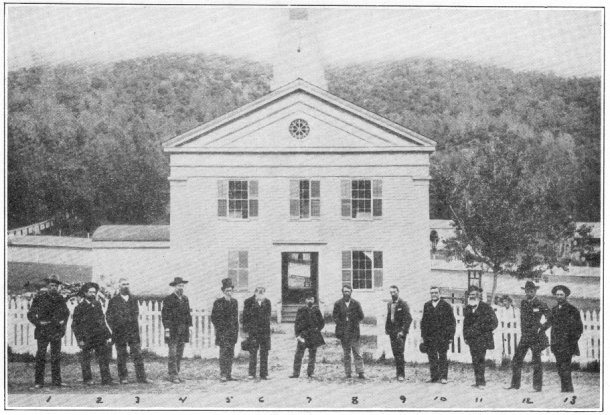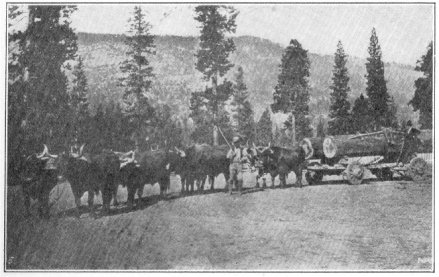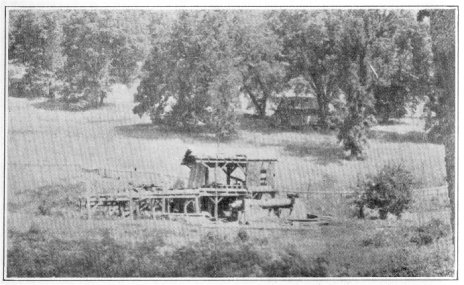Yosemite > Library >
Call of Gold >
22. The First White Woman in Bear Valley >
Next: 23. John S. Diltz •
Contents
• Previous: 21. Fremont Judgment
The Call of Gold (1936) by Newell D. Chamberlain
CHAPTER XXII
THE FIRST WHITE WOMAN IN BEAR VALLEY
Women, especially marriageable ones, were scarce in the early
gold-rush days. Some of the miners, provided they had left a
sweetheart back home, after they had made their first stake,
would send gold for her passage and the marriage would take
place immediately after her arrival. It was dangerous to delay,
for there were many suitors for the hand of each fair lady. There
were some very interesting early-day romances, but there is one,
in particular, which fits in with the story of Fremont’s millions
and the main facts have been handed down by descendants.
Margaret Bigler was the first white woman in Bear Valley. The
mental struggles, which she experienced, can easily be imagined.
Here as a bride she found herself in an environment totally different from anything she had previously been accustomed to. But
she was game. Her husband, Joseph, was employed by the Merced
Mining Company. Being thrifty, he soon saved enough money to
start a saloon, which he operated in as straight a manner as
possible. No gambling was allowed and it soon became very popular with the better class of people, for Bigler knew mining, and
customers liked to linger and talk to him for that reason.
Peter Fee dropped in occasionally, but one drink was his limit
and oftentimes, he took none. He was a very thrifty man, believed
in temperance and his ambition was to acquire a ranch. He was,
also, quite religious and, at times, would endeavor to give a little
sound counsel to some of his reckless friends, but, generally, this
advice went into deaf ears.
Another customer was Karl Peterson, just the opposite to Fee.
Karl had travelled all over the world as a sailor and had been
shipwrecked on his trip to California. He liked to tell how he had
clung to a dry-goods box for two days in the Atlantic, before
being rescued, and said he was now through with the sea, that
he had dropped anchor and would never pull it up. He was quite
a singer and, after he had a few drinks and when requested, and
many times when not, he would stand up on the bar and sing
Norwegian and American songs. He never knew when to stop
drinking and it was difficult to refuse him. His favorite expression
was “forget the noise, give me another drink” and people called
him “forget-the-noise Karl”.
Another frequent visitor was “By Crout Bill” or “Cow Bill
Owen”, the man who donated the site for the County Court
House. Always ready to spin a yarn, he was a colorful character,
and when meeting anyone for the first time, he would always
explain: “I was born in North Carolina, County of Bunkum, near
the mouth of Bull Creek, between Upper and Lower Hog Thief,
right at Screamville and am always known as ‘Old By Grout’.”
Then there was Huck Boland, so named because he liked huckleberry pie. Huck, one day, said, “Boys, I got a claim with millions in it. The spirits told me so”. Pike Smith, standing near,
whispered to a friend, “I must have been the spirits, for I told
him the spot where he found the flyspecks on the rock.”
Many a mining yarn was spun and many specimens of new
strikes shown in Bigler’s saloon. Generally, it was just like one
big happy family, with each one calling the other by a descriptive
nick-name, especially applicable to the person addressed. But one
day, a drunken brawl occurred, while arguing over the Fremont
title, and Bigler, in trying to separate the participants, was killed.
A great crowd attended the funeral. A young man, who had
started to study for the ministry before coming West, preached a
short sermon consoling the bereaved widow and her family and
then said, “Boys, our job is to help this widow with something
more than verbal phrases. I propose that we take up a collection
and raise money, so that she can change this saloon into a bakery or some other business and support herself and family. The
ravens fed Elijah but they won’t feed her, for we have no ravens
here.
“Tiptoe Charlie, you get a gold pan and pass it around to each
one. Start in with Rufus Lockwood. I have been told that he drinks
his coffee from a cup made of ten twenty dollar gold pieces. Anyone who can do that ought to afford a couple of twenties for this
worthy cause.”
Rufus, giant of a man, quickly replied: “It is a pleasure and a
privilege to help a deserving and distressed woman. In the East,
where I came from, no pity was extended to the distressed. I
know, because my own family suffered there from the pangs of
starvation, but, thank God, out here it is different. I will start
the fund with a fifty dollar Mt. Ophir gold slug and I may do even
better.”
“Forget-the-noise Karl, you spend plenty for fire-water. Can’t
you give two or three ounces of gold dust out of your buckskin
bag, so that when you die, St. Peter will remember that you did
some good on this earth. That’s good, but just tip her a little more
for good measure.
“Money-to-burn Pete, I have seen you going around the country
with your wheelbarrow and you always land up where there are
good diggings. They tell me that when you get hold of paper
money, you burn it up. I have also heard that you do a lot of
other foolish things with your money, so why not pull out your
buckskin bag and do the same as ‘Forget-the-noise’. You know
where you and your wheelbarrow can get plenty more.
“Dull Pick Jack, I saw a big stack of winnings on your side
of the table last night at Missouri Pete’s so divvy up in this good
cause.”
And so, the pan went the rounds, not a person being missed and
everybody donating. When the collection was counted, it approximated one thousand dollars.
Bigler’s saloon thus became a bakery. Her place was quite popular and for a time she was able to make a very good living. She
was besieged by many suitors, but she refused offers of marriage,
vowing that she would wait a few years before any further
matrimonial adventures and even said that she contemplated
returning to the East in a snort time.
This was right at the time when the controversy over the Fremont title was the all-important topic of discussion everywhere.
Her husband had worked for the Merced Mining Company and
her sympathy was at first favorable to them. But being in busi
ness, she tried to appear neutral and on every occasion she endeavored to settle arguments by showing there were two sides.
She, however, invested her surplus savings in stock of the Merced Mining Company. After the decision of Judge Burke the value
of her stock shares went away down and the time came when
there were no dividends and no market to sell, and even assessments were called. And like all mining camps, there came a
down period, business became poor and she found herself unable
to pay her rent.
Fremont’s agents were about to evict her, when entirely unexpected, Colonel Fremont dropped into her store, said he had
heard she was having a hard time, and assured her that she would
not be evicted, but could stay as long as she wanted, even if unable to pay her rent.
From that time on, she was a loyal supporter of the Colonel.
Her favorite suitor was a handsome young man working for the
Merced Mining Company. He was sober, industrious and thrifty,
but he was bitter against the Colonel. The widow had been considering him quite favorably, but now she felt that it would be
impossible to marry him, unless he changed his attitude toward
the man who had befriended her.
“My dear, how can you stick up for the Colonel, when you
know he only paid $3000 for the whole grant. How can he be
entitled to property worth millions?”
To which the widow replied, “Suppose you bought a ticket in
the Swiss lottery for a dollar and won $25,000, wouldn’t you feel
that you were entitled to the winnings? And how would you feel,
if someone made you spend half your winnings trying to collect
what was legally yours?”
Her suitor still differed from her viewpoint and she still postponed any decision as to when they would be married, but without giving him the reason.
After the first Supreme Court decision, which was in favor of
the Merced Mining Company, the miners became even more bitter against the Colonel when they learned that he had appealed
the case. Mrs. Bigler’s loyalty to Fremont was having some effect,
for on one occassion, her favorite suitor knocked a rifle out of the
hands of one of the Colonel’s enemies, as he levelled it to shoot.
Time passed on. The Supreme Court seemed slow in making
their final decision, but finally word came that, within a few
days, the decision would be made public.
Each day a crowd of interested persons would assemble at the
newspaper office, where the word would be first received. One
day the crowd was surprised to see a procession of about twenty-five women march up to the newspaper office and ask for Mr.
Holmes. It seems that the women had been annoyed by some of
his editorials against the raising of families in such a tough environment. One day, when he was in a saloon across the street,
they filled their aprons with type and carried the metal to a local
artist to cast a medal.
On this day, they had come to present the medal, in an endeavor to humiliate him. One of the ladies made a short speech but
the tone seemed a little sarcastic. Editor Holmes accepted the
medal, and as he examined it, several of the men stepped up to
his side to see what it was all about. Upon its face, there was an
excellent likeness of the editor and the legend, worded, “To the
Ill. Ed. of the Gaz.” And on the reverse side appeared, “Presented to L. A. Holmes, by the mothers of Mariposa for the interest
and ‘affection manifested to their children”.
One of the men asked, “What does ‘Ill.’ mean?” Holmes replied, “It must mean ‘Illustrious”, whereupon a dozen voices
piped up, “Oh, rats, we thought it meant ‘Illuminated’.”
Pike Oldham entertained the crowd describing some of the rich
strikes he had made. “Boys”, he said, “if you find that you cannot mine on the Grant, I can tell you where there is some rich
ground, at least, pretty close to the spot, say, within a half mile
of it.” This dry humor of Pike’s caused an outburst of laughter,
when “Dull Pick Jack” exclaimed, “I’ve been within one foot of
a rich pocket of over a thousand dollars and then passed by it,
only to learn later, that a tenderfoot, who didn’t know gold from
a piece of Limburg cheese found it a short time afterwards. And
now Pike says he will show us within a half mile of a rich strike,
when I couldn’t find one, when I was only a foot away. I tell you,
boys, it’s all a matter of gol darned luck.”
The crowd that was waiting each day, in front of the Gazette
office, was surely an interesting group. One, who helped to keep
them in good humor, was Tom Bichard, called “French Tom”
in his younger days. He came from the Isle of Man, his father was
French and his mother English, and he was undoubtedly one of
the greatest talkers and wits of the community. “Boys”, he said,
“let me tell you how I came to be called Doctor. I’ve told this
story many times and I know it’s true. We were out prospecting
once and had to contend with Indians. There were twenty-three of
us and it took half of our Company to be on the alert for the red
devils. One day we had all we wanted of fighting. The Indians
came down on us like so many wolves, and at it we went, from
nine in the morning till darkness closed the battle, with one
wounded on our side and seven Indians killed and a good many of
them wounded.
“Our wounded was a young man, by the name of Tim Murphy
and here is how I came to be called Doctor. There was no one in
our party who knew anything at all about surgery, so I told the
boys to take Tim into my tent and I would attend to him.
“ ‘Well, Tim,’ I said, ‘where are you shot?’
“ ‘Oh, Doctor,’ said Tim, ‘It’s meself is entirely kilt and dying.
I em hit in the bladder by the red devils. Oh. arrah acushla, why
did I lave ould Ireland to come out here and be kilt? Oh, Doctor,
is there no hope?’
“ ‘Well Tim,’ says I, ‘I think it is a bad case and if you have
anything to say, you had better hurry up.’
“Very sadly and slowly, poor Tim replied, ‘Well, be after telling
me darlint Maggie that me heart is ever beating for her and if I
die, I will be dead, and if I live, I won’t be dead at all.’
“ ‘I will do as you say, Tim,’ says I, ‘and now let me examine
your wound. You may not be as bad as you think.’
“Tremblingly, he replied, ‘Oh, Doctor, be aisy, and if you can’t
be aisy, be as aisy as you can.’
“I examined his body all over but found not a sign of a wound,
except that a shot had struck his canteen and that was the reason
he thought he was hit in the bladder, for the water from the canteen was the cause of all the trouble. That’s how, boys, I came to
be called Doctor.”
Finally the messenger on horseback arrived with the long-awaited final decision of the Supreme Court, which was read in
full by editor Holmes. Most of the disappointed miners took it in
sportsmanlike manner and made for the saloons to imbibe in liquor that cheered. A few, however, felt that a great injustice had
been done and that the miners should take matters in their own
hands.
The favorite suitor, either was convinced of the logic of the final decision or else felt that there was no further use in hanging on
to a hopeless cause. With the great question settled, which had
been in agitation for so many years, it was not long before the
leaders of the opposition to Colonel Fremont left for other parts
and harmony prevailed.
Within a few weeks, the long-delayed marriage of Margaret
Bigler and Maurice Newman took place. It was a church wedding
and Polly Duff was there, the large parrot, with amazing eyes,
who enjoyed the freedom of the town, roaming here and there
but who always knew without fail when and where a church service was to be held. Then she would perch on the church steeple
and laugh and talk to the guests, as they entered the church.
Maurice Newman proved a distinguished citizen, serving fourteen
years as County Assessor and then as County Clerk, County Auditor and County Recorder.
Next: 23. John S. Diltz •
Contents
• Previous: 21. Fremont Judgment
http://www.yosemite.ca.us/library/call_of_gold/first_white_woman.html


